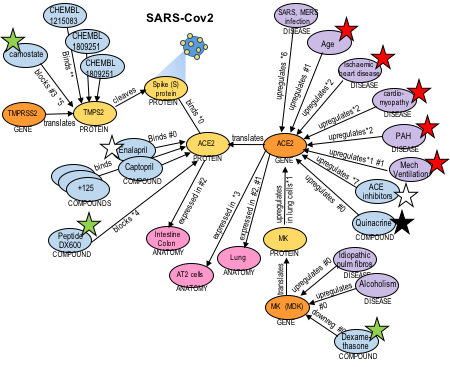
Image: Courtesy Sergio Baranzini
By Sarah Paris
Human health has become so complex that even doctors turn to Google to understand difficult cases. But no search engine is currently specialized enough to handle rare or complex conditions, find a potential cure for a given disease, or discover the root of a biological process. Phase Two of a multi-scale, open knowledge network for precision medicine (known as SPOKE) will integrate billions of biomedical concepts, making it possible for physicians and scientists to connect the dots and produce meaningful answers to their questions.
The project was announced last September, with a National Science Foundation Convergence Accelerator Phase One award providing initial funding of $1M. The Phase Two funding is $5M and will bring the total to $6M over three years. It is led by Sergio Baranzini, PhD, Professor of Neurology at UCSF, in collaboration with Sharat Israni, PhD, Executive Director and Chief Technology Officer of Bakar Computational Health Sciences Institute.
The continued funding reflects the progress made on the project. In March, a visualizer for the network was opened up for anyone to access and explore the graph. Since then, the SPOKE team has been working with groups both inside and outside UCSF to integrate the knowledge network with existing platforms.
At UCSF, SPOKE is being incorporated into the BRIDGE application to bring precision medicine into the clinic. Working with collaborators at NIH, the SPOKE team aims to make the NIH NCATS Translator one of the knowledge providers for that application. Similarly, ongoing work with NASA AMES will make SPOKE available to the GeneLab tool.
Phase Two of the project also includes a growing collaboration with Indiana University, Institute for Systems Biology (ISB), Lawrence Livermore National Labs, Stanford Medicine, UCSD, and the aforementioned Google. The data giant has prototyped SPOKE into its Data Commons platform, a broad effort to connect all available data on the internet.
“Successful reductionistic science has uncovered much of how biological systems work at different scales, but that knowledge remains within specific disciplines. SPOKE is attempting to integrate as much knowledge as possible across disciplines into a unified, computer-readable system to enable more efficient translational research, faster drug discovery, and better patient care," said Baranzini.
Importantly, given the urgent need to address the COVID-19 pandemic, SPOKE is being mined to investigating potential treatments. Research led by SPOKE's collaborators at ISB predicted that steroids would be beneficial to COVID-19 patients on mechanical ventilation, (released as a preprint back in March.) This result was subsequently validated with the published findings that dexamethasone reduced 28-day mortality, compared with patients on invasive mechanical ventilation or oxygen,

Collaborators on the project also include Jim Brase, Deputy Associate Director for Computation at Lawrence Livermore National Laboratory (LLNL) and Sui Huang, MD, PhD, Professor at the Institute for Systems Biology (ISB). Atul Butte, MD, PhD, the director of the Bakar Computational Health Sciences Institute, and Keith Yamamoto, PhD, vice chancellor of Science Policy and Strategy and director of UCSF Precision Medicine, continue to serve as advisors to SPOKE in Phase Two.
“This Phase Two award will expand SPOKE’s capacity to do what the human brain cannot – to integrate vast amounts of biomedical information, across many different data types, and to extract new knowledge from correlations and patterns that connect data points. It will be an increasingly powerful discovery engine that will enable physicians, researchers, pharmaceutical investigators, and citizen scientists to create lab-testable hypotheses, infer efficacious new therapeutic regimens, develop new drugs and new uses for old ones, and determine why the incidence and progression of a disease differs between individuals," said Yamamoto.
Read more about the award: Accelerating Research to Impact Society at Scale (NSF Announcement)
